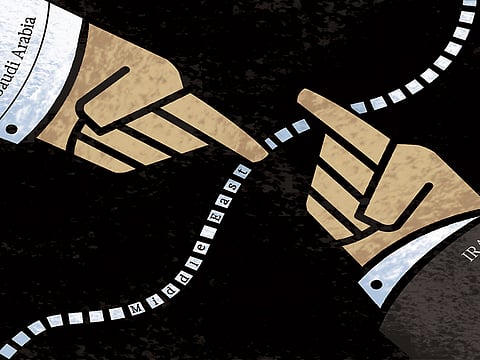Saudi Arabia-Iran rift will complicate crises
Attempts to normalise Arab-Iranian relations over the years have not been successful. Mistrust has grown as hardline leaders have tightened their grip on the affairs of the Islamic Republic

Serious escalation in Saudi Arabia-Iran relations following Riyadh’s execution of 47 convicted terrorists, including a Shiite cleric, and the storming of the Saudi embassy and consulate by Iranian mobs earlier this month is the latest episode in a long history of mistrust and animosity between the two countries. Both Saudi Arabia and Bahrain have severed diplomatic relations with Iran while other Gulf countries have taken less dramatic measures. Tehran’s belated apology at the UN Security Council — which has reprimanded Iran for breaching its commitment to protect diplomatic missions — has done little to reduce tensions.
For now it seems unlikely that Saudi Arabia will respond positively to mediation offers by Ankara and Moscow. Meanwhile, Riyadh will take seriously threats made by senior Iranian clerical and military leaders. While direct military confrontation seems a remote possibility, the crisis will have repercussions on ongoing regional conflicts in Iraq, Syria, Lebanon and Yemen. The Saudis, and most GCC countries, see Tehran’s meddling in Arab affairs as the most geopolitical threat to regional stability. Furthermore, Iran stands today as the main culprit behind the conflagration of sectarian confrontation between Sunnis and Shiites across the region.
The Saudis’ reaction is a calculated one. There cannot be any doubt that Tehran’s clerical institution, backed by hard-line politicians, is directly responsible for spreading sectarian hostilities in Iraq which has kept that country locked in civil and religious strife for years. Iran continues to play a major role in prolonging the Syrian civil war by directly backing President Bashar Al Assad’s ruthless regime. Revolutionary Guard and Hezbollah fighters have taken the lead from regime’s forces in crushing the Syrian revolution and confronting rebel groups in major flashpoints.
And historically, Iran has been a factor of instability in Lebanon by backing Hezbollah, which has prevented political reconciliation and an end to that country’s predicament. Iran’s meddling in the affairs of Bahrain, Yemen, Kuwait and Saudi Arabia’s eastern province continues today in an abrasive challenge to these countries’ sovereignty.
Attempts to normalise relations between Tehran and most Arab countries over the years have not been successful. Gulf countries supported Iraq’s Saddam Hussain in his eight-year war against Iran in the 1980s. Iran’s Khomeini had threatened to export its revolution to the Gulf following the overthrow of the Shah in 1979. Iran had never relinquished its occupation of UAE islands, Abu Mousa, and Greater and Lesser Tunbs, and some leaders continued to claim that Bahrain is an Iranian territory. Mistrust had always engulfed Arab-Iranian relations as hard-line leaders tightened their grip on the affairs of the Islamic Republic.
The US invasion of Iraq in 2003 and subsequent dismantling of that country’s army and state institutions gave Iran the opportunity to spread its influence over that country and to back Shiite politicians who pursued policies of persecution, intimidation and even liquidation of Iraq’s Sunni minority. This is one key reason, along with myopic US policies, for the emergence of radical extremist groups, such as Daesh (the self-proclaimed Islamic State of Iraq and the Levant) in majority Sunni provinces.
Tehran’s leaders have always viewed Saudi Arabia as a key rival and an obstacle towards forcing their own agenda in the Gulf region. In addition to backing an insurgency in Bahrain and foiling attempts for reconciliation, Tehran miscalculated when it sided with Yemen’s Al Houthi militants against the legitimate government in Sana’a. As the Al Houthi-Saleh alliance, supported by Iran, attempted to take over the country, Riyadh was forced to intervene militarily through an Arab coalition to stop what was seen as direct intervention by Tehran in Saudi Arabia’s backyard.
Riyadh’s suspicion of Tehran’s regional agenda increased as the US reached an international agreement with Iran over its nuclear programme. Under that controversial deal economic sanctions will be lifted and billions of dollars will be made available to Tehran. The Saudis and other Arab states viewed this deal as a dangerous development that would enable Tehran’s leaders to expand their regional agenda.
The current showdown between Saudi Arabia and Iran will reflect negatively the ongoing regional crises. While direct confrontation is unlikely, the face-off will further deepen sectarian tensions and feed proxy wars in Yemen, Syria and Iraq. It will further destabilise Lebanon and may even create rifts within the GCC as some countries may not support Riyadh’s efforts completely.
Saudis’ qualms about Tehran’s agenda are founded. Iran’s involvement in regional crises is self-evident. Its leaders have done little to hide their territorial ambitions. The struggle between so-called reformers and conservatives inside Iran has so far benefitted hard-liners.
One negative side effect of the current confrontation is that Daesh and other extremist groups may thrive once again as a result of the deepening sectarian divide. Another outcome of this latest row is that Washington will see further weakening of its leverage over Riyadh, which is now bent on following a more independent evaluation of regional challenges.
For now one thing is clear; the rift between the two countries is likely to widen and as a result many regional crises, where the two countries have stakes, will get more complicated. The fall in oil prices and the economic challenges that both countries will face will add to the region’s perils for most of this year.
Osama Al Sharif is a journalist and political commentator based in Amman.
Sign up for the Daily Briefing
Get the latest news and updates straight to your inbox


